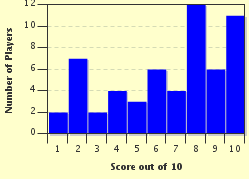Quiz Answer Key and Fun Facts
1. "From fairest creatures we desire increase."
This is the first line of Shakespeare's first sonnet. This is a metaphor for what?
2. "That thereby beauty's ____ might never die."
There is a blank spot in the above line. What belongs in that spot?
3. "His tender hair might bear his memory."
Uh oh, one of those words is not correct. Which word is incorrect, and what should be put in its place?
4. "Feed'st thy light's flame with self-__________ fuel."
The word that is missing represents fuel from one's own body. What word is it that is missing?
5. "Making a famine where abundance lies."
In Shakespeare's time, there were periods of famine and periods of what opposite?
6. "Thy self thy foe, to thy sweet self too cruel."
What does "thy self thy foe" mean?
7. "Thou that art now the world's fresh ___________."
This phrase is about a youth (most of the sonnet is). What word belongs here, though?
8. "And only herald to this gaudy season."
Actually, he does not use the word "season". Which of these words DOES he use?
9. "Pity the world, or else this glutton be."
Why pity the world?
10. In this entire sonnet, Shakespeare is mainly speaking to a specific type of person. To whom is the sonnet directed?
Source: Author
salami_swami
This quiz was reviewed by FunTrivia editor
MotherGoose before going online.
Any errors found in FunTrivia content are routinely corrected through our feedback system.


